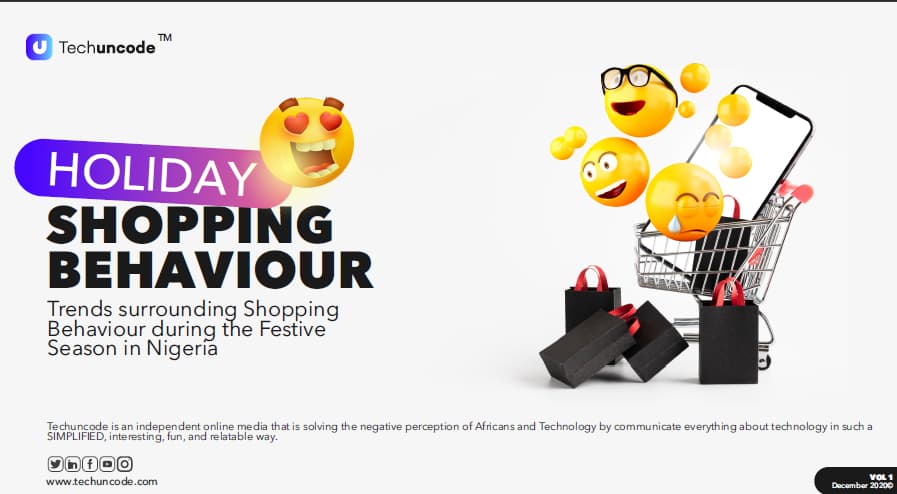It’s the holiday season and holiday shopping 2020 is underway. Everyone seems to be psyched about the festive season. Well, the whole Techuncode team does feel psyched about it, and we can bet our third-quarter earnings on the fact that you do too.
This season is known for many exciting things. It never gets by without family vacations, non-stop partying, and most certainly, a shopping spree.
While you’ve been out there buying a lot of stuff, we’ve been right here keeping our tabs on you.
Yes, you, but certainly not in the creepy way teenagers would stalk their high school crush.
We researched pre-holiday and holiday shopping 2020 trends among Nigerians and found some pretty exciting things.
Hopefully, our holiday shopping report 2020will help you see how others around you are shopping this festive season.
We also hope that it’d allow you to make some guided decisions when planning your next shopping escapade. So, please stick with us while we run you through our findings.
What’s new in 2020?
We can say without flinching that 2020 was one hell of a year. Totally unprecedented.
This year, nations were brought to their knees, and many people in business broke more than just a few sweats in the ring.
Some had it right, though; talk about Elon Musk. He moved up the Forbes billionaire leader board twice this year after Tesla’s stock continued to skyrocket.
He beat Mark Zuckerberg and Knocked out Bill Gates barely two months after. We were quite shocked at his performance too. Like what???
But, on the other hand, many other businesses, business owners, and individuals felt the brutal impact of the COVID-19 pandemic this year.
The whole world took a hit from the spread of the Covid-19 pandemic. Consequently, many nations around the world have been thrown into a recession.
Sadly, Nigeria happens to be one of those nations. As a result, consumer behaviour has witnessed a rapid change within the country.
As part of our research, we conducted a survey with a select group of consumers within different age brackets.
When asked if the pandemic will affect their spending during the festive season, 55% of the respondent gave affirmative responses.
In more precise terms, they said yes. 18% of the respondents weren’t quite sure if it would or not. Only 27% of the sample were confident that it wouldn’t.
Just in case you were wondering what my response would have been if I was among the respondents, it indeed would have been a yes.
The pandemic was undoubtedly a big deal, and not many of us were invincible from its impact.
According to our research, functionality was ranked as the topmost factor considered by consumers before shopping this year
This means that promotions and advertisement may have played some roles in moving consumers’ hands to place orders for certain products this year, but certainly not as much as the product’s proven functionality itself.
How Nigerians shop before the holiday season
Consumers have always been known to shop sparingly before the end of the year holidays.
For most of the year, the rate at which consumers shopped was quite linear. It only changed by a few percentages month on month. But, there was a brief moment when this changed.
Many consumers resort to panic buying during the pandemic’s heat to ensure they had enough stock to last them for the lockdown period.
This resulted in an unexpected peak in shopping.
Although, throughout the shopping spike, Nigerians shopped majorly for essential commodities like food items, sanitary kits, and home appliances, among other things.
Reportedly, spending on data subscriptions, on-demand video streaming, and pay-television also increased alongside spending on fuel during the period.
However, after the panic from the lockdown subsided, spending began to trend downwards.
The peak shopping month before the holiday season
Before the holiday season kicks in, Nigerians begin intense shopping during the month of November. A bulk of these shopping activities have been attributed to Black Friday sales.
During the period, shoppers get the best deals on items they’ve had their eyes on for the longest time.
These undeniable offers incite impulsive shopping.
As a result, shopping activities for the year reaches an all-time high in November.
Many folks shop for gift items in preparation for the festive season starting from Black Friday.
Preferred shopping destination
Nigerians are increasingly moving their shopping activities online.
As captured in our report, an additional 5.3million shoppers moved from offline to online platforms between 2018 and 2019.
It is, however, essential to note that more folks still shop offline.

As of 2019, 63% (122million) of Nigerians still preferred the traditional mode of shopping. On the other hand, 37% (77milllion) of Nigerians caught the digital wind.
These numbers represent a marginal 1.3% year-on-year growth in online shopping activities.
As mobile penetration continues to increase, we might see more shoppers make transitions from offline stores to online stores.
However, for now, the numbers are growing slowly but steadily.
Social media has set you up to pull out your wallet more than you know
Social media has been ranked as the number one influence on pre-holiday shopping activities.
Remember that one time when you saw a nice pair of shoes on a social media page and placed an order for it? Well, thousands of social media users were doing just about the same thing at that same time.
On social media, conversations around certain products help to create publicity for them.
Consequently, many interested folks go looking for these products, and a significant number of them end up buying the product.
A classic example of a product that’s benefiting from the word-of-mouth on social media at the moment will be Bone Straight. Many folks heard about this hair product for the first time on social media.
Although they might end up buying the product from an offline or online store, their journey towards purchasing the item started from a social media page.
When products like the PS5 hit the market, gamers wait for reviews by social media content creators.
These reviews help to give them a hint on the expected features of the gaming console.
Consequently, it allows them to decide whether the product is a worthy buy or not.
People shop on social media
Shopping through social media is swiftly becoming commonplace.
Frankly, it’s a lot more fun shopping there these days. After scrolling through so many eye candies, wanting one just becomes inevitable.
Usually, after that want comes commitment. Having the same reaction from millions of social media users contributes largely to the rate of pre-holiday shopping.
Many folks shop on Instagram or Twitter because they believe it’s a safe space. It’s social media! People never hold back their comments.
They’d be glad to troll any vendor that performs below expectation. Hence, the comments – either good or bad, guide shoppers to the perfect vendor or product.
Several social media platforms serve as directories to online stores.
This means that they lead people interested in buying an item to a store where they can find them.
On the other hand, some pages function as stores themselves.
Interestingly, the teams behind the different existing social media platforms have recognized this new appreciation for integrating online stores into social media.
They are beginning to invest in new ways to make shopping on these platforms more relaxing.
All prominent social media platforms, including Facebook, Whatsapp, Instagram, and YouTube, have all announced new features to enhance the shopping experience on their platforms at some point this year.
Most recently, Whatsapp announced the addition of shopping carts to its in-app store.
These new additions have made it easier for social media users to shop conveniently.
Hence, contributing mainly to shopping activities throughout the year.
The biggest online shop in Nigeria
Wondering where most Nigerians do their local online shopping? We’ll tell you; it’s Jumia. Jumia is the leading e-commerce store in Africa and Nigeria by quite a margin.

According to our research, 57% of the total 126.07 million local internet population shop on Jumia. Konga follows from a distance.
They hold 27% of the entire internet population in Nigeria. Jiji.ng follows closely in the third position, holding 24% of the internet population.
What device do online shoppers use the most for online shopping before the holiday shopping season?
Conversations on making web pages mobile-friendly have gone on for years.
This is because research analysts have found that most people access the web through their smartphones. This is not any different from shopping.
Whether folks are shopping on social media or online stores, they do it with their smartphones more often.

According to our 2020 holiday shopping statistics, more people are shopping with their smartphones year on year.
But, on the other hand, fewer people visit online stores using their PCs or tablets.
As of 2018, 35% of online store visitors used their PCs. In 2019, that number reduced to 23.69%.
That accounts for a drastic 11.31% fall. Likewise, 3% of online shoppers visited the stores using Tablets in 2018. In 2019, the number reduced to 1.21%
However, folks using smartphones to shop online are picking up numbers dramatically.
Their numbers have increased from 62% to 75.1% from 2018 t0 2019.
How Nigerians will embark on holiday shopping 2020
According to our research, more men visit online stores than women. There’s a gaping distance between the number of men and women who shop online.
Men account for a whopping 63% of the total number of people who shop online.
On the other hand, women account for 37% of online shoppers in Nigeria.
However, this all takes a turn during the 2020 holiday shopping season.
Starting from the festive period, women shop deliberately for the festive season more than men.
A whopping 84% of the 39% of women who shop online attested to shopping towards the festive season. However, only 61% of the 68% of men who shop ordinarily shop deliberately for the festive season.
This brings the total number of men who shop for the festive season lower than women.
So, maybe we wouldn’t be wrong if we said that women cared more about the festive season than men.
Where are people looking to shop this holiday?
During the festive season, shoppers look everywhere for their desired gift items. Most shoppers use a combination of online stores and offline stores. In previous seasons, 54% of shoppers used a mix of online and online platforms. Conversely, 42% of shoppers visited offline stores solely, while 4% visited online stores alone.
This year, 62% of shoppers are browsing through both online and offline stores. On the other hand, this year’s number of people visiting offline platforms has reduced from the initial 42% to 32%. Contrariwise, the number of people shopping for the festive season through online platforms alone increased this year. Although almost insignificant, the numbers have gone up from 4% to 6%.
A higher percentage of the people shopping offline do so in open markets. Others shop from supermarkets, hypermarkets, and neighbourhood stores.
Significant influences on 2020 holiday shopping
Certain factors influence shopping activities at the end of the year. The top three among these factors were; price/promotion, product feature, and brand in previous years. Why these three factors? You might ask. Here’s a simple explanation
- Price/promotion: Although there’s usually a spike in spending during the festive season, every shopper tries to look out for the best deals available. There’s always a lot to spend on from drinks to gifts, and food, among other things. Hence, shoppers lookout for promotional offers to help them save some funds. The cashback gotten from these promotional offers can then be expended on other necessary items.
- Product feature: Many folks buy gift items for their friends and relatives. Bearing in mind that they want these gift items to be meaningful, they give more consideration to the product’s features before opting for them.
- Brand: Many brands have been associated with class. Hence, their products are naturally suited for gift items. This explains why young folks might wish for an iPhone or a Nike Jordan for Christmas without specifying what model. They just want any item from the brand’s product collection because of the social credibility that those brands have created over time.
However, as we have already established, 2020 was an unprecedented year.
As such, some new factors now influence end-of-the-year shopping behaviour.
Top on the list this year is dependency.
As it turns out, being thoughtful this year would mean getting your loved one’s gift items that could add to the quality of their lives rather than just amuse them.
This brings us to what people are shopping for this festive season.
Intended items for 2020 holiday shopping
Based on our research, most Nigerians have chosen food and drinks as their most intended shopping item this season.
A projected 38% of total spending this season will be on food and beverages.
This is quite fitting considering that most people will be staying indoors and isolating with their loved ones instead of going out to cinemas, restaurants, or parks.

Second, on the list of items intended to be purchased this festive season is clothing.
23% of the total spending this season will account for clothes while 14% will account for household goods and appliances.
You can find the rest of the intended items in the image below.

Also, during this period, more Nigerians will be spending between 10,000 and 100,000 on shopping. Most of these payments will be made with cash.
Nigerians seem to be adopting digital means of payment but at a relatively slow pace. 31% of shoppers will make payments using money.
Another 24% will be using credit cards.
Bank transfer and mobile payment are ranked as third and fourth options with 18% and 15%.
In summary
The COVID-19 pandemic affected a whole lot of things. But, it wasn’t enough to throw the idea of shopping out of the water.
Shoppers will still be filling up their carts as usual, only with different items than in past years.
We hope you’d be going out to shop for yourself and your loved ones this festive season.
More so, we hope that this review would serve to guide you on your shopping journey.
If you have any observations or feedback, kindly let us know in the comment section below.
Click here to download the FULL REPORT on Trends Surrounding Shopping Behaviour during the Festive Season in Nigeria.
Found this interesting? Share!























 and then
and then